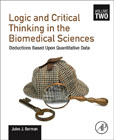
Logic and Critical Thinking in the Biomedical Sciences: Volume 2: Deductions Based Upon Quantitative Data
Berman, Jules J.
Primer on Biomedical Deduction: Simple Ways to Understand What Your Data is Trying to Tell You provides biomedical students and scientists with a repertoire of deductive non-mathematical methods, that helps them draw useful inferences from their own data. The past decade has witnessed a huge increase in the number of books describing advanced mathematical methods for data analysis; however, experienced scientists know that such methods lead to erroneous conclusions unless the researchers have a deep understanding of what the data is trying to say. Individuals with keen observational skills, regardless of their mathematical training, are in the best position to draw correct inferences from the data, and to guide the subsequent implementation of robust, mathematical analyses. The second volume, Looking at the numbers, tackles the challenges that arise when available data is quantitative, not descriptive. All too often, individuals engaged in the biomedical sciences assume that numeric data must be left to the proper authorities (e.g., statisticians and data analysts), who are trained to apply sophisticated mathematical algorithms to sets of data. This is a terrible mistake insofar as the individuals who create data (e.g., biomedical scientists) are in the best position to understand what their data really means. The volume provides readers with a set of non-mathematical skills that allows them to understand, and draw valid inferences from, numeric data. This book is a valuable source for several members of biomedical field who need to understand better how to make sense of all the medical data available currently. Provides a serious and scientific based discussion on deductive methods in the biomedical sciencesDiscusses deduction with a linear and coherent narrative, in order to engage and guide the readers on a full understanding of such complex, but neglect topicBrings examples and case studies in a relaxed manner, intended to draw the reader's attention to general concepts, without dwelling excessively on details INDICE: 9. Learning what counting tells us 10. Drawing inferences from absences of data values 11. Drawing Inferences from Data Ranges 12. Drawing inferences from outliers and exceptions 13. What we learn when the bell curve won't fit our data 14. Resolving cause and effect puzzles with time-stamped data 15. Heuristic methods that use random numbers
- ISBN: 978-0-12-821369-8
- Editorial: Academic Press
- Encuadernacion: Rústica
- Páginas: 300
- Fecha Publicación: 01/09/2020
- Nº Volúmenes: 1
- Idioma: Inglés
